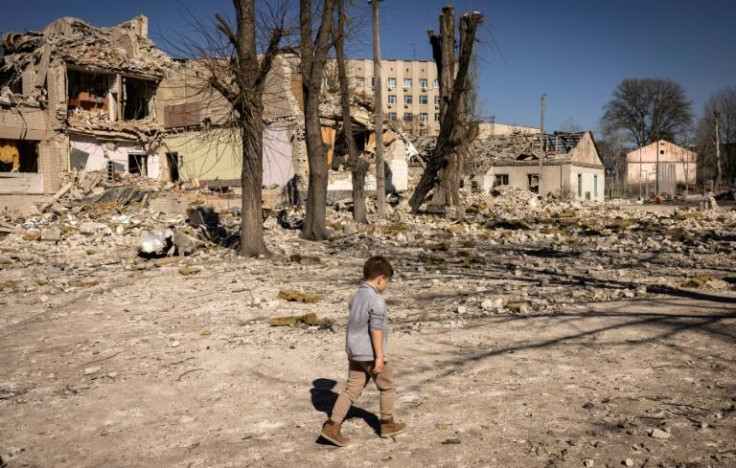The UK is fighting against Russia's forced deportation of Ukrainian children
Ukrainian children have been unlawfully bought to Russia, and forced into pro-Russia re-education camps. The UK has implemented 14 sanctions in response to Russia's attempts to destroy Ukrainian national identity.

This year, over 19,000 identified Ukrainian children have been forcibly deported to Russia or to temporarily Russian-controlled territories, the UK government reports.
Grigory Karasin, a member of Russia's upper house of parliament reported that around 700,000 Ukrainian children have been unlawfully bought to Russia since the Russia-Ukraine War escalated in 2022.
There have been reports that Ukrainian children are being stripped of their national identity and ushered into pro-Russia re-education facilities. The re-education camps have been located in illegally annexed Crimea and mainland Russia, where the children are forced to endure a Russia-centric academic, patriotic, cultural, and military education.
Evidence also shows that the children are being illegally adopted by families in Russia, as well as being given Russian nationality and passports.
On 17 June, Foreign Secretary James Cleverly announced that 14 new sanctions will be put in place – in response to Russia's attempts to destroy Ukrainian national identity. Out of the 14 sanctions, 11 are against those involved in the unlawful deportation of children.
The Foreign Secretary said: "Today's sanctions hold those who prop up Putin's regime to account, including those who would see Ukraine destroyed, its national identity dissolved, and its future erased."
The Russian officials who have played an insidious role in the calculated forced transfer programme against Ukrainian children include Ksenia Mishonova, the Commissioner for Children's Rights in the Moscow Region, and Sergey Kravtsov, the Minister of Education of Russia.
Timofey Sergeytsev, a Russian Propagandist, has also been sanctioned for spreading intense levels of hateful propaganda that has been designed to stir up violence and hatred towards Ukraine and the Ukrainian people.
In February 2022, almost immediately after Putin launched his "special military operation", Timofey Sergeytsev wrote an opinion piece that called the full-scale invasion "a chance for revenge".
"In his chilling programme of forced child deportation & hate-filled propaganda spewed by his lackeys, we see Putin’s true intention - to wipe #Ukraine from the map." Today the UK has sanctioned 14 people linked to Russia's mass kidnapping of 🇺🇦 children. https://t.co/B4bVmKJWrP pic.twitter.com/hGazSpX0ue
— Glasnost Gone (@GlasnostGone) July 17, 2023
James Cleverly declared that in the President of Russia's, "chilling programme of forced child deportation, and the hate-filled propaganda spewed by his lackeys, we see Putin's true intention – to wipe Ukraine from the map".
The 14 penalties, imposed by the UK government and international partners, are the most severe sanctions that have been imposed on a major economy.
Since the start of the conflict, more than 1,600 individuals and organisations have been sanctioned. This number includes 29 banks, with global assets of £1 trillion, more than 130 oligarchs who have a combined net worth of over £145 billion, and more than £20 billion worth of UK-Russia trade.
On Monday (17 June) in Moscow, the decision to cut off the Black Sea Grain Initiative, which allows vital grain supplies to be shipped from Ukraine to the rest of the world was finalised.
The Black Sea Grain deal, which was agreed upon by the UN and Turkey, ensures that Russian food and fertiliser reach global markets, supports the stabilisation of global food prices, and lowers intense levels of famine worldwide.
If Russia does not agree to a renewal of the Black Sea Grain Initiative, millions of people across the globe will face increased levels of food insecurity.
Action Against Hunger, a Non-Governmental Organisation that aims to tackle hunger crises, estimates that there are 49 million people in 43 countries around the globe that are at risk of falling into famine or a severe hunger crisis.
As a result of President Putin's aggression, thermal and renewable power stations in Ukraine have suffered huge amounts of damage, and Europe's over-dependence on Russian gas has been exposed.
The UK is working with international partners to ban the importation of Russian coal, oil and liquefied neutral gas to address the underlying vulnerability to international fossil fuel prices.
The UK has also committed nearly £140 million to assist Ukraine's response to the attacks on its energy infrastructure.
© Copyright IBTimes 2025. All rights reserved.





















